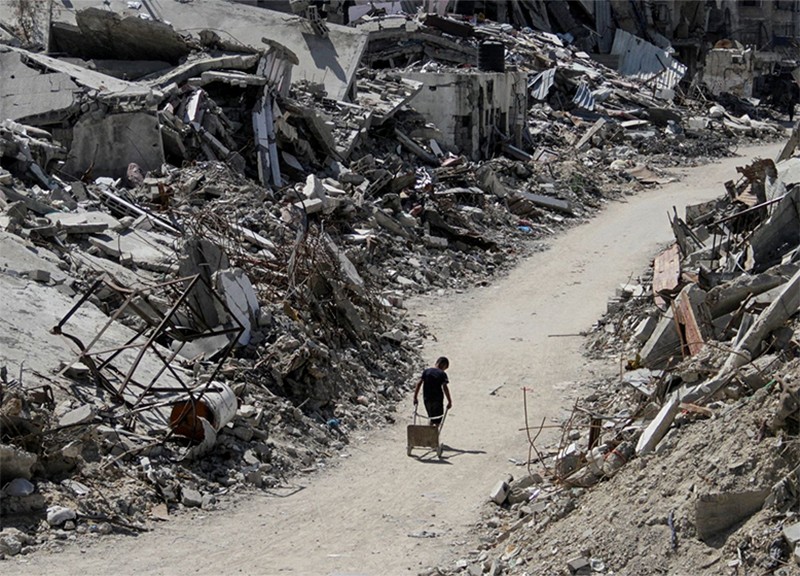
Failure of repeated cycles of negotiations is frustrating those who have most to gain from an end to the war
By Fatima AbdulKarim, Dov Lieber and Abeer Ayyoub, WSJ
Gaza’s war-weary population is growing increasingly frustrated with the fruitless cycles of cease-fire talks, as a new poll of Palestinians shows support for Hamas dwindling in the enclave.
Months of diplomacy among Israel, Hamas and mediators from the U.S., Egypt and Qatar have failed to produce agreement even on the outline of a deal that would stop the fighting and free Israeli hostages.
The back and forth, as the death toll from the war mounts and the humanitarian situation in the Gaza Strip deteriorates, is fueling unprecedented public discontent in Gaza with the militant group that seized power there nearly two decades ago.
“Hamas drove the bus to the edge and lost control, ”said Omaima Abu Eid, a 5-year-old Gaza resident. “ They are not negotiating for us, they are negotiating to stay in power after all this devastation.”
Fadi Awad, a 32-year-old electrician and father of five living in a tent in central Gaza, said he was fed up with the talks. “We hear positive talks, then pull back, then breakthrough, then it all falls apart and with it, our lives, ”he said.
“Our leaders, Hamas, the Arabs, they watches on TV from their hotels,” he said. “[They] do not know what it’s like to run for your life, hungry and barefoot.”
Support for Hamas as rulers in Gaza has fallen to 46% from 52% over the past three months, according to a survey of more than 700 residents of the enclave. In the West Bank, the trend is reversed, with 71% of Palestinians surveyed supporting Hamas’s continued rule in Gaza, up from 64% in a previous poll, by the Palestinian Center for Policy and Survey Research.
Hamas didn't respond to a request for comment. The Hamas military leader in Gaza, Yahya Sinwar, is calculating that more fighting and more Palestinian civilian deaths work to his advantage, messages he has sent to cease-fire mediators and Hamas colleagues show.
The survey took place at the end of May, before a recent Israeli operation to rescue four hostages left 274 Palestinians dead and 700 injured, say Palestinian health officials. Israel's aid about 100 Palestinians were killed or wounded, including Hamas militants and civilians.
In response to there rescue operation, Hamas has hardened its negotiating stance, adding new terms that move further away from Israel’s stated position to a proposal presented by President Biden almost two weeks ago. The militant group said in Wednesday that it had shown the “required positivity” to reach an agreement that “meets our peoples just demands, including a permanent cease-fire, complete withdrawal from the territory, return of displaced people, reconstruction and a serious prisoner exchange deal.”
U.S. national security adviser Jake Sullivan said Thursday that Hamas hadn’t accepted the proposal but instead had responded with an amended plan.
Both Israël and Hamas have haggled over fundamental differences preventing them from reaching a cease-fire, in a familiar playbook that has ended each time in a collapse of talks. Hamas wants a permanent stop to the war and withdrawal of Israeli forces in exchange for hostages held in Gaza. Israel has said it won't leave Hamas intact in the enclave and needs its hostages back before the war is declared over.
“People in Gaza have lost faith in Hamas, including many of the movements supporters. But people hate Israël more,” said a resident.
Hamas typically has cracked down on public dissent in peacetime. But with Hamas personnel largely gone from the streets, public criticism of the group inside Gaza is growing, including on social media. At the same time, fear of retribution from Hamas for voicing criticism of the group is diminishing, locals say.
Nu’man Hamouda, a 23-year-old accountant, has lost nine relatives, several friends, his job and home during the war. “If Hamas and Abbas heard our screams they will be the ones to end this now, unite and say they surrender,” he said, referring to Mahmoud Abbas, president of the Palestinian Authority.
Despite Hamas’s waning popularity in Gaza, the latest poll found that it is still by far the most popular Palestinian political party in Gaza and the West Bank. More than two thirds of those polled said they supported the Oct.7 attacks.
The level of public criticism of Hamas is unprecedented, stemming from the perception that Hamas is detached from the everyday suffering of Gazans, said Mkhaimar Abusada, associate professor of political science at Al-Azhar University in Gaza and now based in Cairo.
While polls show Hamas continues to enjoy popularity among Palestinians in general, who see the group as having revived their cause on the global stage, wartime polls don’t really capture the strength of feeling against Hamas among Gazans, Abusada said. “Maybe 80% of Palestinians in the West Bank and diaspora love Hamas, something that gave them honoror dignity, but for someone who lives in Gaza and is paying the price, it’s a totally different story,” he said.














